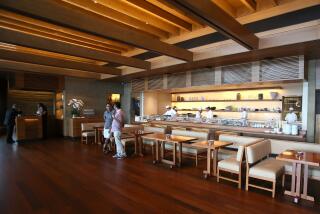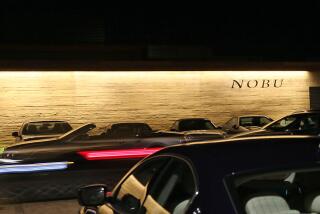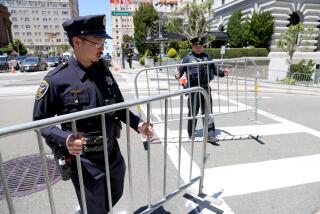Judge Rules for Cafe in Suit Over Breast-Feeding
- Share via
A Beverly Hills restaurant did not violate a woman’s civil rights when a hostess asked her to either breast-feed her child discreetly, or do so in the restroom, a Los Angeles judge has ruled.
In a suit filed five years ago against Cafe Rodeo, Nicole Kaufman alleged she was not given the option of discreetly breast-feeding her infant at her table.
Superior Court Judge Richard Wells ruled Wednesday in favor of the restaurant, which maintained that it had done so.
“The restaurant’s policy--a continuing policy--is that if a woman goes into the restaurant and she is breast-feeding but is discreet about it, we have no problem,” Aaron Shelden, the attorney representing the restaurant, said Thursday. He added that the ruling was a vindication of the restaurant’s position.
Attorney Gloria Allred, representing Kaufman, a graphics artist, blasted the court’s decision as “anti-mother and anti-child.”
At a press conference Thursday to announce plans to appeal Wells’ decision, Allred said she will seek a broader ruling to prohibit all restaurants from “banning” breast-feeding mothers from their dining rooms.
“Breast-feeding is not a crime,” the attorney said. “Is the restaurant going to argue next that there should be separate lunch counters for breast-feeding mothers and infants, such as blacks were subjected to in the South in the ‘50s?
”. . . Breast-feeding mothers and their babies should not have to be banned to Devil’s Island, or to a restroom, because they have chosen the most important form of bonding that can exist between a mother and child.”
Allred contended that the trial evidence--including testimony of a woman who stated that two years ago she also was banned to the Cafe Rodeo’s restroom to breast-feed her child--demonstrated that, in reality, the restaurant had a policy limiting breast-feeding to the women’s restroom.
The witness, Bonnie Shuster, told reporters at Thursday’s press conference that her breast was “completely covered” by a large shirt at the restaurant when she was asked to go to the ladies’ room.
“So why should the court believe . . . the restaurant?” she asked.
Acknowledging the conflicting evidence, Wells noted in his ruling that the burden of proof rested with the plaintiff.
But he was apparently unswayed by evidence presented by the plaintiff’s lawyers.
In his decision, Wells said that even if the restaurant employee failed to give Kaufman the option of breast-feeding discreetly, “such failure was an oversight and did not constitute discrimination” under the law.
The judge added that, even if, as Shuster testified, she was not allowed to discreetly breast-feed at the table, “this might constitute a single violation” but “does not establish a pattern. . . .”
Several Los Angeles-area restaurateurs told The Times earlier this week that they have no objection to women breast-feeding in their establishments.
Shelden insisted that his clients, the owners and management of Cafe Rodeo, do not object either.
“I believe this whole thing has just been blown all out of proportion,” the lawyer said.
More to Read
Eat your way across L.A.
Get our weekly Tasting Notes newsletter for reviews, news and more.
You may occasionally receive promotional content from the Los Angeles Times.







